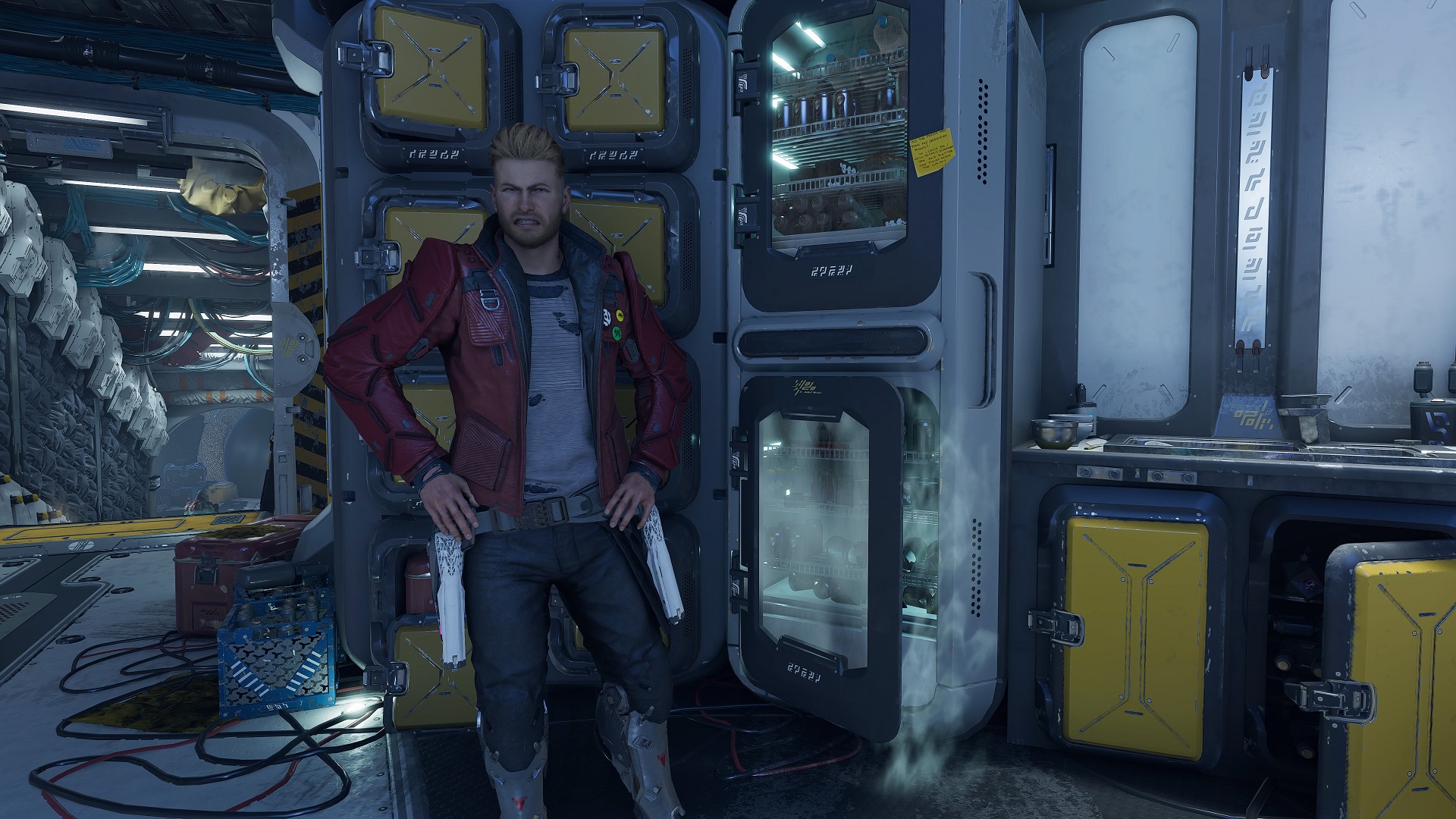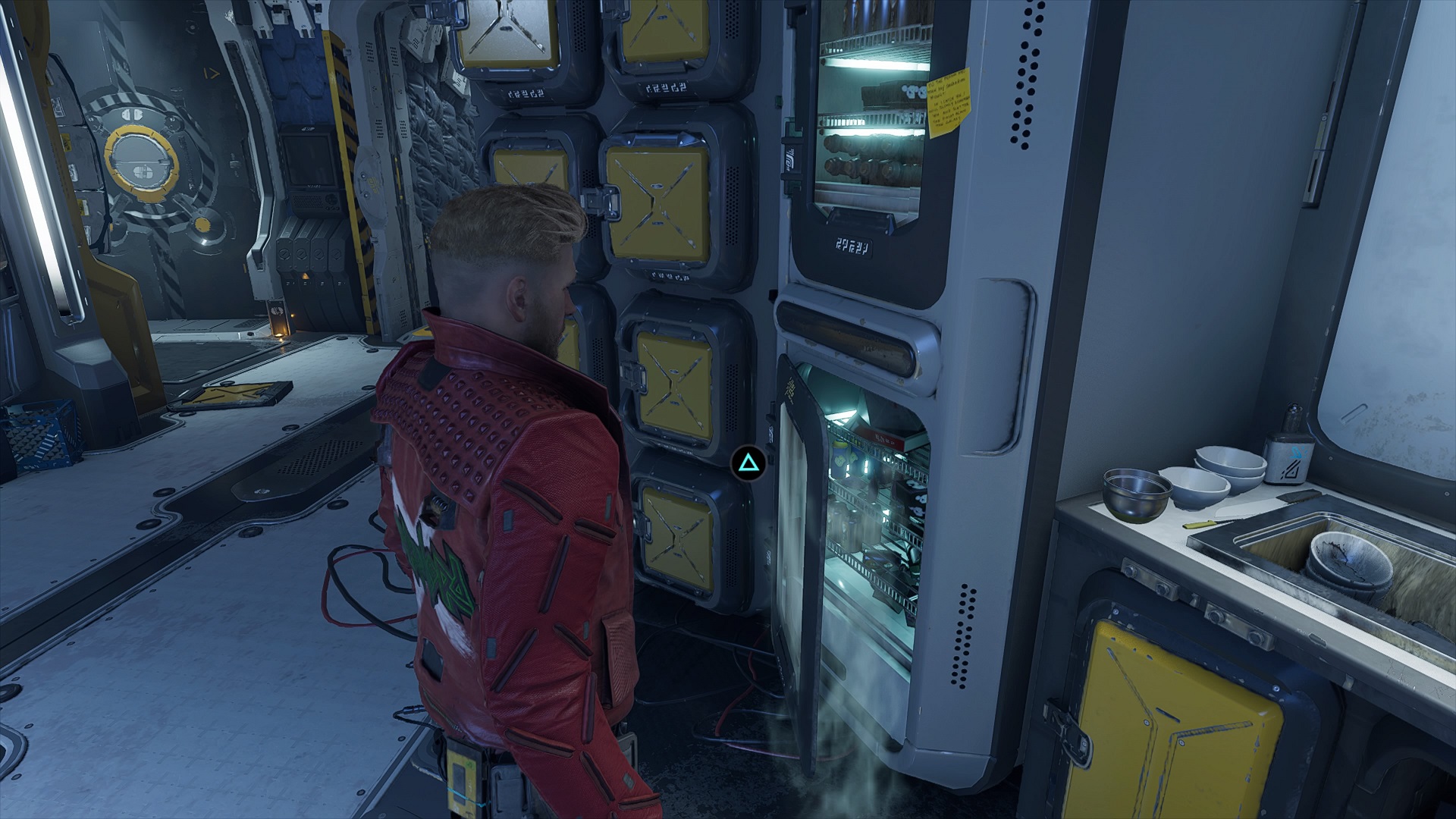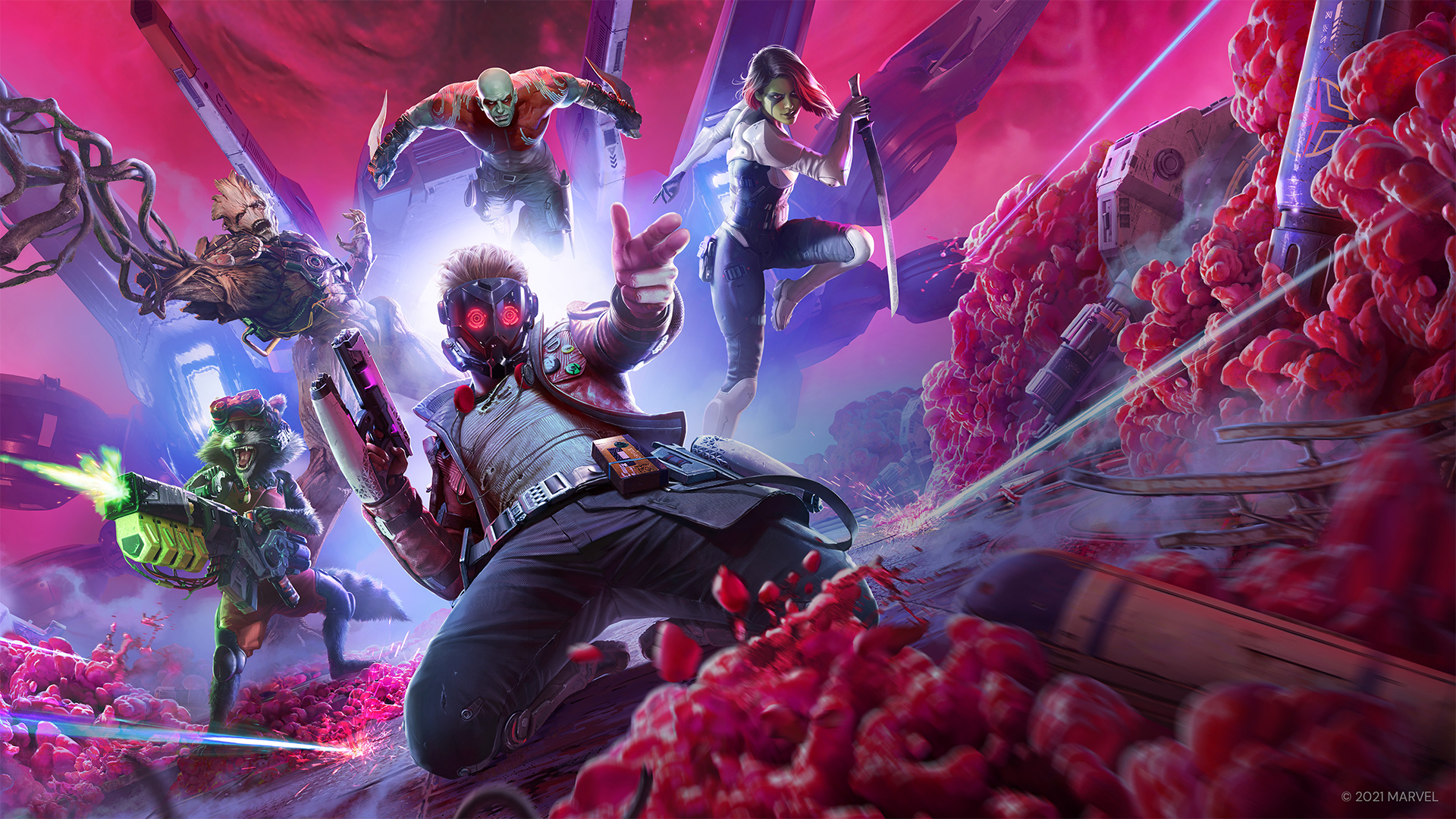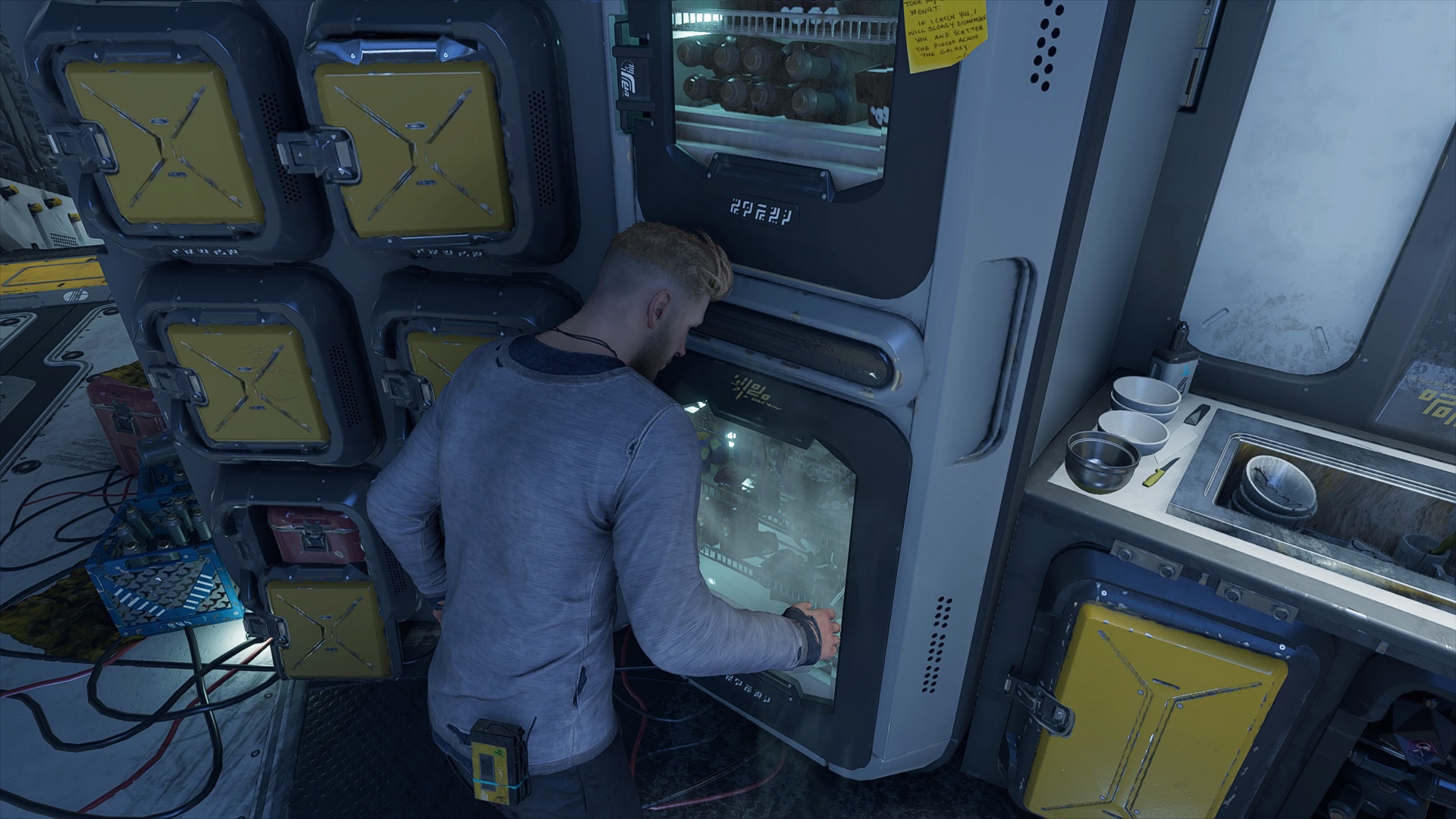Exploring the origins of the "mythical fridge door" in Marvel's Guardians of the Galaxy
How Always Sunny in Philadelphia and Modern Family inspired the fridge door joke in Marvel's Guardians of the Galaxy

Star-Lord has to deal with a lot in Marvel's Guardians of the Galaxy. Surviving in the cosmos, keeping his rag-tag team together, stopping a llama-like alien from eating parts of his ship… oh, and trying to save the universe. No one ever said being a leader is without its challenges. But no task is greater or seemingly more unachievable than keeping the fridge door closed aboard the Milano.
The Milano ship is the place Peter Quill and the crew call home, and it's where you can spend some downtime in between the action to get to know your team. It sets the scene for lots of memorable moments, but the ship's fridge is the one fixture that refuses to leave my mind. Throughout the adventure, you'll more often than not find the Milano's fridge door ajar. You can hit a button prompt to close it, but it never stays closed for long.
Even though it is a feature that you can miss if you choose not to close it, the fridge door is such an effective piece of environmental storytelling that adds to the worldbuilding of Marvel's Guardians of the Galaxy. Along with the bigger core decisions you make, the broken door makes you feel like you're having a direct effect on Quill's story and on the crew who react to your ongoing actions. So just how did Eidos Montreal come up with the idea to bring in this memorable, incidental side story that revolves around an open fridge door?
"It's funny, because this is a discussion I had with some of my colleagues a few days ago. We couldn't remember who came up with this idea," says senior creative director Jean-François Dugas. "My world designer thinks it is me, my narrative director thinks it is her. Nevertheless, it came from one of us! We were talking about how to make the Milano a lived-in place. Many ideas were generated, thus the origins of the mythical fridge door."
Feels like home


Marvel's Guardians of the Galaxy is a reminder that great games don't have to live on forever.
The Milano certainly feels like a "lived-in place" as Dugas puts it. From the messy kitchen countertop with unwashed dishes to the scuff marks and dents that litter the surface of walls and floors. The attention to detail really brings the ship to life and effectively gives you the impression that this is a place that has been through some wear and tear. The personal effects that decorate each crew member's living quarters also give you a taste of their personalities through the environment alone. Everything on the ship really does feel like it's there to tell you this is home.
The fridge, and the conversations around it, successfully add to the homey feel of the ship, which is partly why the team brought in this detail. As an environmental piece of storytelling, it is also a way to show the players the Guardians aren't exactly living a life of luxury. "In a household, how many times do we see something simple break," says Dugas, "with us forever procrastinating before fixing it? More often than not, family members implicitly wait hoping for someone else in the household to take care of it. We wanted to capture that feel, that dynamic. It also was a way to show that the Guardians are living on limited resources, they don't have enough money to maintain the ship in all its details."
The fact that the fridge remains broken and open is such an effective incidental piece of environmental storytelling that speaks to the crew who don't do anything about it, and to you as the person who keeps deciding to close it. Why is it always open? Why will no one ever fix it, or close it for that matter? These are the questions I imagine Quills asks every time I get him to shut the door. On one occasion when I go to close it, Rocket begins to squabble with Drax about the need to fix the door, but it ultimately leads nowhere. In this moment more than any other, it really does often feel like the crew is my oddball family, who argue over the household items.
Weekly digests, tales from the communities you love, and more
"Irrational need"

"My inspiration was based on Phil Dunphy in Modern Family constantly stumbling on the house stairs that he never repaired, and one episode from Always Sunny in Philadelphia."
Jean-François Dugas
As well as effectively creating an environment that feels like home, there's no denying that it's also just a very funny feature to include in such an otherworldly setting. While there are some very moving moments in Marvel's Guardians of the Galaxy, humor plays a huge role in making the adventure such a blast to play. While Dugas can't quite pinpoint who came up with the original idea for the "mythical fridge door", the creative director does recall that comedy shows sparked the initial inspiration to make the fridge an ongoing joke.
"The only thing I remember is embracing the idea of the broken fridge," says Dugas. "My inspiration was based on Phil Dunphy in Modern Family constantly stumbling on the house stairs that he never repaired, and one episode from Always Sunny in Philadelphia. In that one, Charlie passes by a stool in the bar where he works many times during the episode, and each time, he replaces/shakes the stool before going to his next objective. This reasoning behind it never gets justified, but it is just so funny. So, based on that, I started to see how the fridge door would be an endless joke that would never get resolved."
In order to make this running fridge door joke work, though, Dugas explains that the team had to iterate on the actual action of closing the door to make sure it was relatively quick to do. After all, if the interaction went on too long, players might not want to keep hitting that button prompt. "If I remember correctly, it [the open fridge] came to be in the last half of the production cycle. When we started to work on the 'show don't tell' for the Milano moments," Dugas says. "Once it was validated that we'd be able to support the broken fridge from a production standpoint, we wrote lines to make it part of the experience."
"The first iterations were too slow. Peter would look at the fridge, bend down, close the door, stand up, and go back into gameplay," Dugas continues. "I was like, 'If it stays like that, players will close it once and never again if the sequence is too long.' I ended up filming myself at home passing by my wine fridge, closing the door quickly, and moving on immediately as a reference to make the sequence snappier. I wanted to make sure that our irrational need for it to be closed would be encouraged to manifest itself as often as possible!"
This process certainly paid off. I found myself constantly compelled to keep on closing that fridge door during my time as Star-Lord. But I could never have quite imagined just how fixated on this door I would become when I first went over to close it. The way it weaves into a little side story because of my incessant need to keep it shut soon transformed this forever-open-refrigerator into one of the most memorable features on the Milano. The lasting impression the fridge left on me and many other players really is a testament to just how effective Eidos Montreal's storytelling really is, right down to the little environmental details. And the response from players, as Dugas says, is "the reason why we love to make games!"
Guardians of the Galaxy tips | Guardians of the Galaxy upgrades available | Hide the creature or hide the tech in Guardians of the Galaxy? | Guardians of the Galaxy box under the stairs | All Guardians of the Galaxy choices | Guardians of the Galaxy Huddle answers | Sell Groot or Rocket in Guardians of the Galaxy? | How long is the Guardians of the Galaxy game? | Should you throw Rocket in Guardians of the Galaxy? | Is Guardians of the Galaxy co op? | Guardians of the Galaxy game Easter eggs | Guardians of the Galaxy new game plus options | Guardians of the Galaxy lottery ticket | Guardians of the Galaxy escape the foggy cave

I started out writing for the games section of a student-run website as an undergrad, and continued to write about games in my free time during retail and temp jobs for a number of years. Eventually, I earned an MA in magazine journalism at Cardiff University, and soon after got my first official role in the industry as a content editor for Stuff magazine. After writing about all things tech and games-related, I then did a brief stint as a freelancer before I landed my role as a staff writer here at GamesRadar+. Now I get to write features, previews, and reviews, and when I'm not doing that, you can usually find me lost in any one of the Dragon Age or Mass Effect games, tucking into another delightful indie, or drinking far too much tea for my own good.


